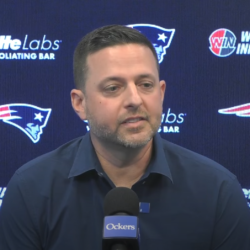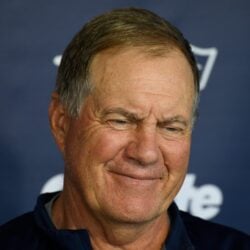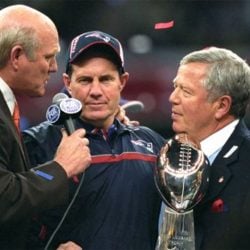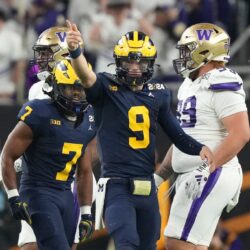A historical look at the uniform numbers for the new Patriots: #16, Reese Wiggins
We are in the dead zone of the NFL year folks, that time between the finish of draft and the start of training camp. With the exception of the one day a week that the media has access to organized team activities, there's not much to go over that hasn't already been over-analyzed - so with that in mind here is the seventh in a series of historical perspectives at who has previously worn the uniform number of the 2014 additions to the roster of the New England Patriots. Unless noted otherwise all the players listed took part in at least one regular or playoff game in the season listed for the Patriots.
Reese Wiggins is the latest member of the Pats to don the number 16; here is a look at those who have preceded him to wear that jersey over the years during the franchise history of the Patriots.
16 – Wide Receiver Reese Wiggins
- The Patriots signed Wiggins on May 27, which brought their roster up to the maximum size of 90 players for the first time in this league year. The 5' 11", 193 lbs Wiggins was an All-Conference USA honorable mention at East Carolina last year, with 26 receptions for 372 yards and four touchdowns. In three seasons with the Pirates he had 80 receptions for 1,012 yards and eight touchdowns. At his pro day Wiggins ran a 4.37 forty, a 4.17 shuttle, a 6.89 three-cone, had a vertical jump of 40 inches and a broad jump of 10' 01".
2013: WR Greg Orton (practice squad; no regular-season games)
- Orton was a starter for three of his four years at Purdue, amassing 203 receptions (fifth most in school history) for 2,356 yards (sixth in school history) and 13 touchdowns for the Boilermakers. The Bengals signed him as an undrafted rookie in 2009 after a mediocre showing at the Combine (4.69 forty). Cincinnati waived him at the end of training camp, and the Packers had him in for a visit late in the season, but did not offer him a deal. Orton then spent some time playing football outside of the NFL. In 2010 Orton was a member of the Arena League champion Spokane Shock, and the following season he led the team in receptions (120), receiving yards (1,588), and touchdowns (37).
Later in 2011 Orton signed with the Omaha Nighthawks of the United Football League, but he left them a week later when Denver offered him a contract. The Broncos released him as part of the final camp cuts, but after signing with the Arena League's Arizona Rattlers the Broncos brought him back to the practice squad, from week 13 through the end of the season. Orton reportedly looked very good during the off-season, but a high ankle sprain early in training camp slowed him down, and he was cut at the end of camp. Denver re-signed him to their practice squad for the entire 2012 season, but after another ankle injury he was waived/injured in the first wave of training camp cuts in 2013. The Patriots signed Orton to a reserve/future contract on January 20, 2014, and released him on May 22 when DB Dax Swanson and DL L.T. Tuipulotu were signed. Orton will turn 28 in December; at that age you have to figure more opportunities are doubtful, and those practice squads and training camps will be as close as he ever gets to playing in the NFL.
2012: WR Kamar Aiken
- At Central Florida, Aiken set school records in receiving for a true freshman with 33 catches, 584 yards receiving, and five touchdowns. Over his career with the Golden Knights Aiken had 121 receptions for 1,924 yards and 17 touchdowns, and also chipped in with eight tackles on special teams. Aiken was signed as an undrafted free agent by the Bills in 2011, but he was released as part of the final camp roster cuts. Buffalo re-signed Aiken to their practice squad, and in November he was promoted to the 53-man roster when Donald Jones went on IR. Aiken was inactive for all but two games in 2011 with no stats, and in 2012 he was once again cut at the end of training camp.
The Bears signed him to their practice squad in October and released him four weeks later; the Patriots then signed him on November 19 to their practice squad. Aiken was then Ventroned over the next two weeks. He was promoted to the 53-man roster on December 22, shortly after Donte' Stallworth was placed on IR; he saw action the next day in New England's week 16 victory at Jacksonville on special teams, as well as three snaps at wide receiver. Aiken was then released on Monday, re-signed to the practice squad Tuesday, and then again promoted to the 53-man roster. He remained there for week 17 and the two playoff games, but was inactive for all three of those games.
Aiken remained with the Patriots through the 2013 off-season, but was part of the first round of training camp cuts on August 26. Later he had a workout with the Bears, and on October 30 he joined Baltimore's practice squad. Aiken spent the rest of 2013 with the Ravens, and is still currently on their roster. As of this time he is credited with three NFL games, with no receptions and one tackle.
2009-12: WR Shun White (Reserve/Military list; no regular-season games)
- As a running back at Navy, White set a single-game school record with 348 yards rushing on August 30, 2008. He was one of three Midshipmen (Eric Ketanni, Tyree Barnes) on the Pats 2009 roster. He was placed on the Reserve/Military list on August 17, 2009 so that he could fulfill his military obligations; the Patriots released him on March 28, 2013.
2005-08: QB Matt Cassel
- Despite having virtually zero college experience (20-33 in four years at USC, backing up Carson Palmer and Matt Leinart), the Patriots drafted Cassel in the 7th round (230th overall) in the 2005 NFL draft. In training camp he outperformed Rohan Davey and Chris Redman, and made the final roster. His rookie season he saw action in two games: garbage time at San Diego, and in the final regular season game of the year against Miami. The Pats were in odd situation for that game, where a loss was preferable as it gave the a first-round game against Jacksonville (whom they would defeat, 28-3) rather than Pittsburgh. Cassel went 11-20 with two touchdowns (to Tim Dwight and Ben Watson) in the game that is most remembered for being the one that Doug Flutie made a drop-kick for an extra point. Over the next two years he was generally active on the game-day roster, but never got on the field; excluding that Miami game, through three seasons he had thrown 19 passes.
In 2008 Cassel was thrust into the spotlight when Tom Brady suffered a torn ACL in the first quarter of the first game - and immediately connected with Randy Moss for a 51-yard completion. He completed 63% of his passes for 3,693 yards and 21 touchdowns (with only 11 interceptions), as the Patriots went 10-6. At the end of the year the Patriots placed the franchise tag on him, and he was eventually traded to Kansas City with Mike Vrabel for the 34th pick in the 2009 draft. The Chiefs signed Cassel to a a six-year, $62 million contract with $28 million guaranteed. Cassel's numbers dropped to 55% complete, 2,924 yards, 16 touchdowns and 16 picks, and the Chiefs went 4-12; Kansas City fans immediately became disgruntled with the two former Patriots, Cassel and GM Scott Pioli. 2009 was much better as KC went 10-6 and won the AFC West; Cassel threw for 3,116 yards with 27 touchdowns and only seven interceptions, and was a Pro Bowl alternate. However, 2011 started badly, and the fans and media again turned their wrath on Cassel. In the first two games the Chiefs were blown out by a combined score of 89-10 to the Bills and Lions, with Cassel throwing one garbage time touchdown and three picks. Cassel and the club rebounded to win four straight, but he was placed on IR with a hand injury suffered in week 10. The 2012 season again started slowly, with the low point being when Kansas City fans cheered when Cassel had to leave a game with a head injury.
It was obvious that the fans and media wanted Cassel gone, and the following March Cassel was released. He signed on with Minnesota to back up Christian Ponder, who was awful. The Vikings later signed Josh Freeman, who was even worse; coach Leslie Frazier, despite needing wins to save his job, inexplicably was reluctant to let Cassel start. The Vikings won only five games in 2013, with Cassel being the starter of primary quarterback in all of those wins - while Ponder and Freeman went a combined 1-7-1 in games when they were the primary QB. In March the Vikings re-signed Cassel to a two-year, $10 million deal; he'll keep the seat warm until rookie Teddy Bridgewater is ready to start.
2004: QB Kliff Kingsbury (off-season and IR only; camp cut in '04; wore 15 in '03)
- At Texas Tech in 2002, Kingsbury led the NCAA with 5,017 yards passing and 45 touchdowns. He set 39 school records, 16 Big-12 records, and 17 NCAA records during his four-year college career with the Red Raiders. As a senior he was awarded the Sammy Baugh Trophy, presented annually to the nation's best college quarterback. The Patriots drafted him in the 6th round of the 2003 draft, 201st overall. He was placed on injured reserve on August 27, though as a member of the team he did get himself a Super Bowl ring.
The Patriots released Kingsbury at the end of the '04 camp, on September 3rd. He bounced around the league for several years after that. Kingsbury spent 2005 on the Saints' practice squad, and was then cut at the end of camp in '05. He then spent two weeks on Denver's practice squad before signing with the Jets. He remained on their roster for most of the 2005 season but was usually inactive on gamedays; he finished the year with three appearances and one completion in two attempts. In January of 2006 the Jets assigned Kingsbury to the Cologne Centurions of NFL Europe where he completed 58 of 102 passes for 633 yards and two touchdowns; in May the Jets released him. The Bills claimed Kingsbury off waivers, but he was cut at the end of their '06 training camp. Tampa Bay worked him out but that was the last of Kingsbury's NFL career. He spent 2007 in the CFL with Montreal and Winnipeg, and then embarked on a college coaching career.
From 2008-11 Kingsbury was with the University of Houston, eventually becoming offensive coordinator for a prolific offense that featured Case Keenum at quarterback. He then became the OC at Texas A&M and received much notice there, with the Aggies moving to the SEC and turning heads with Johnny Manziel at quarterback. Last year Kingsbury returned to his alma mater to become head coach at Texas Tech.
Note: Kingsbury wore number 15 in 2003, and switched to his college number, 16, in 2004
2001-03: WR Scott McCready (practice squad and off-season only; no regular-season games)
- McCready went to South Florida, and was signed as an undrafted free agent by the Patriots in April of 2001. He was the first British-born non-kicker to make an NFL roster - he moved to the US at age 15 - and the first British player to earn a Super Bowl ring. The Patriots released him before the start of training camp in '01, but re-signed him to their practice squad on Halloween of that year. The Pats re-signed McCready, and assigned him to NFL Europe in 2002. He was cut at the end of training camp in '02, and re-signed to the practice squad in October.
In 2003 the Patriots again assigned McCready to NFL Europe; with the Scottish Claymores he finished the season with 23 receptions for 337 yards and three touchdowns. McCready suffered a shoulder injury early in the 2003 training camp, and he was waived with an injury settlement. The Packers then signed him, and they too allocated him to NFL Europe, where he led the league with 59 receptions. In June of 2004 the Carolina Panthers signed McCready, but he was cut at the end of their camp. McCready played for the Hamburg Sea Devils of NFL Europe in 2005, and then signed with the Chiefs in the 2006 off-season. McCready missed time in camp with an arm injury, and Kansas City released him at the end of August.
2000: WR Matt Bumgardner (off-season only; camp cut)
- Bumgardner had 37 catches for 582 yards (15.7 yards per catch) and scored four touchdowns at Texas A&M, where he also sprinted on their track team; his senior year he had 18 receptions for 282 yards and three touchdowns. The Patriots signed him for his speed as an undrafted free agent, but he did not make the final roster. Bumgardner now works for a nonprofit organization in Houston that is dedicated to improving the quality of life for families with children that have special needs.
1992-98: QB Scott Zolak
- Zolak went to the University of Maryland, where he was stuck backing up Neil O'Donnell until his season year. That season he led the ACC in pass completions and passing yards, and the Patriots drafted him in the 4th round of the 1991 draft with the 84th overall pick. He spent all of 1991 as the "emergency" third string quarterback, and did not get any playing time. In '92 Hugh Millen was the starter, but he was sidelined with an injury behind a porous offensive line after five games. Tommy Hodson, who was drafted in the third round out of LSU in 1990 took over, but was ineffective as the Pats went 0-6 with him as their starter. The next week Zolak made his first career start, with Dante Scarnecchia getting his first game as head coach due to Dick MacPherson's landing in the hospital with acute diverticulitis. The Pats got their first win of the season that day, with Zolak completing 20 of 29 passes for 261 yards, two touchdowns, defeating the Colts 37–34.
Zolak was named AFC Player of the Week, but that first NFL start turned out to be the highlight of his pro football career. The Pats did beat the Jets the next week, but Zolak was only 7-16 for 102 yards and no touchdowns. The Patriots were shut out in each of the next two games, and he alternated with Millen and Jeff Carlson at quarterback for the rest of the year. Zolak finished the season 52-100 for 561 yards, two touchdowns and four interceptions. The next season the Patriots drafted Drew Bledsoe, and Zolak would only start three more NFL games. He stuck with the Patriots as their backup until 1998, and then signed with the Jets, but did not make their roster. Zolak landed in Miami and spent one season with the Dolphins before calling it quits. He finished his seven-year career with the Patriots with 1,314 yards passing, eight touchdowns, seven interceptions, and 81 yards rushing.
Since his pro football career ended, Zolak has worked in sports radio and television industry in the Boston area; since 2012 he has worked the Patriots radio broadcasts as the analyst alongside play-by-play man Gil Santos.
1971-75: QB Jim Plunkett
- In his first game at Stanford, Plunkette threw for 277 yards and four touchdowns - on just 13 passes. That year he set a Pac-8 record with 2,156 yards passing, and the next year broke his won record with 2,673 yards and 20 touchdowns. Plunkett came back for his senior year and led the NCAA in passing yards, completions, touchdown passes, total yards and total touchdowns. Along with being an All-American, Plunkett won the Maxwell Award as the College Player of the Year and the Heisman Trophy, and then led Stanford to a startling upset over #1-ranked Ohio State in the Rose Bowl.
A year earlier the Vikings went to the Super Bowl with Joe Kapp as their quarterback, but contract negotiations with the former CFL player broke down. In what was then an unprecedented move, Kapp became a free agent - he had played the previous year without a contract - and Boston area fans and media were in glee when the Pats signed him as for the then-pricey sum of $150,000 per year. The adulation and optimism for Kapp was short lived; Kapp threw only three touchdowns while throwing 17 interceptions, and under Clive Rush the Pats went 2-12 - a record that earned them the first pick in the 1971 draft.
Plunkett started every game for the next four years, and in his rookie season he brought some hope to fans. His first game was also the first one held in the new Schaefer Stadium, and behind Plunkett the Pats rallied in the second half to come back and upset the defending AFC champion Oakland Raiders 20-6. The Patriots finished 6-8 in '71, a vast improvement from the previous year, and the team's best record in five years. Plunkett passed for 2,158 yards and 19 touchdowns and was named Rookie of the Year.
Unfortunately the offensive line was still a mess, and Plunkett endured a horrific beating during those years; he was sacked 97 times from 1972-74. Chuck Fairbanks replaced John Mazur as the Patriots coach in 1973, and installed an offense that had Plunkett running some option plays and continuing to take a beating. By 1975 the spirit was willing but the body was not, and Plunkett was replaced by a younger, more mobile Steve Grogan, who was a much better fit in Fairbanks' offense. Plunkett was traded in the off-season in a lop-sided deal that would benefit the Patriots immensely. San Francisco gave up two 1976 first round picks, a first and second round pick in 1977, and backup quarterback Tom Owen for Plunkett. Those draft picks would turn into center Pete Brock, cornerback Raymond Clayborn, safety Tim Fox and running back Horace Ivory, and help turn the Patriots into one of the best teams in the NFL in the late 1970s.
Plunkett's body was still too beaten up from numerous knee and shoulder injuries for him to be effective with the 49ers, and they released him after the 1977 season. He signed with Oakland and appeared in only four games with 15 passes in two seasons. In 1980 he was 33, but by now he was completely healed. With virtually no playing time in the last two years and third on the depth chart, Plunkett asked to be traded - but Al Davis would not oblige. In week five starting quarterback Dan Pastorini broke his leg, and Raiders' coach Tom Flores decided to go with Plunkett rather than first round draft pick Marc Wilson. It was a wise choice as the Raiders went 9-2 with Plunkett under center to make the playoffs (after a 2-3 start), and then win four playoff games to become the first wild card team to win the Super Bowl. Plunkett threw for 261 yards and three touchdowns with no interceptions, as the Raiders opened up a 24-3 lead before cruising to a 27-10 victory over the Eagles in New Orleans. Plunkett was named Super Bowl MVP, becoming only the second player (along with Roger Staubach) to win the Heisman and be the Super Bowl MVP.
The following year the younger Wilson was handed the reins as the starter, and Plunkett returned to being the backup. In 1982 Plunkett regained the starting position, and the Raiders - who had just moved to Los Angeles - went 8-1 in a strike-shortened season. The following year the Raiders made Wilson the starter again, but once again turned to Plunkett when he was injured. The Raiders won the AFC West for the third time in four years - with Plunkett as their primary starter each time - with a 12-4 record. They breezed through the playoffs, winning three games by a combined score of 106-33, culminated by a 38-9 throttling of Washington in the Super Bowl. Including the post-season Plunkett had gone 13-3 as the starter that year for the Raiders.
To this day Plunkett is the only quarterback to win two Super Bowls that is not in the Pro Football Hall of Fame. Plunkett was one of five Heisman Trophy award winners to be part of the Patriots organization; the others were 1960 winner Joe Bellino, 1984 winner Doug Flutie, 1986 winner Vinny Testaverde, and 2007 winner Tim Tebow. Of that group only Bellino and Plunkett were originally drafter by the Patriots. Plunkett finished his career with the Patriots with 9,932 yards passing; at the time that was second most in franchise history, and is sixth most today. He also fifth in franchise history in touchdown passes with 62. He finished his NFL career with 25,882 yards passing and 164 touchdown passes, plus 2,293 yards and 11 touchdowns in the playoffs. In Super Bowl history Plunkett ranks second to only Joe Montana with a career passer rating of 122.83, third in yards per pass (9.41), and has the third-best single game passer rating (145.04 in Super Bowl 15). In 1992 Plunkett was named to the Bay Area Sports Hall of Fame, in 1995 he was an original member of the San Jose Sports Hall of Fame, and in 2007 he was enshrined in the California Sports Hall of Fame. Since retiring from the NFL in 1987 he has worked doing Raiders post-game radio broadcasts.
Previously:
Follow on Twitter @AllThingsPats
2014 NFL Calendar and Key Dates for the New England Patriots









